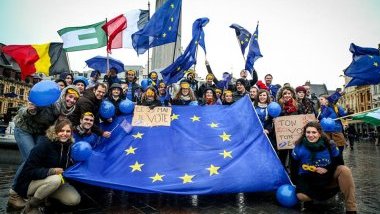Let’s start by the question who? The answer: the European Commission. More precisely the Directorate-General Communication, headed by the Commission’s Vice-President Margot Wallström. The next question arising by itself is why? The basic idea of this particular forum is linked to the broader strategy of the Commission based on its White Paper on the EU Communication Policy and the Plan D for Democracy, Dialogue and Debate. The later two being a direct consequence and Commission’s response to the failed referenda on the Constitutional Treaty in France and the Netherlands in May 2005. Here we can quote one of the Forum’s participants saying this was the typically foolish mea culpa response by the Commission claiming responsibility for something it had no or very little influence on (like in the case of both mentioned referenda).
(Mis)understanding communication
Not withstanding this amusing allusion, from the European civil society point of you it was high time to start the direct dialogue between the EU institutions and the EU citizens. Yet there was a communication bug planted in this dialogue right from the start, as the two sides have different understandings of how this dialogue should look like. In this was more than evident during the Bergamo event. The Commission came there only to listen and wanted to consult the European civil society, while the numerous representatives of the later wanted to engage in a proper dialogue.
The Commission came to listen, while the civil society wanted a proper dialogue.
Before going into detailed examples of this genuine miscommunication, let us briefly answer the questions when and where this event took place. The Commission chose Bergamo, a picturesque town in Northern Italy, some 45 kilometres from Milan. The idea was to go local. And so they did with all the pro’s and con’s of such a venue. It must be said that the organisation was rather stereotypically Italian – badly organised but well executed. A lot of information online before hands, almost no or limited information on the spot.
Double standards for spending EU money
A lot of money spent on fancy hotels and expensive flights. Interestingly enough, unlike most youth NGOs participating in the Commission’s Youth Programme (YP), the Commission itself doesn’t seem to go through the same rigorous revision procedure (e.g. no boarding passes or tickets were collected, thus no real proof according to YP standards, that we were actually there). But then again no lunch was provided. These were only minor contradictions in comparison to the whole organisation of debates and so-called parallel events.

Evaluation of the event
So how was the event organised? The opening conference was more like a talk-show with the participants resembling more a TV audience than anything else. The prominent keynote speakers such as MEP Borislaw Geremek and ex-Commissioner Mario Monti had some nice interventions but the whole thing didn’t really reach out to the participants as many of us had hoped for and resembled yet again another elitist intellectual panel-like debate without much substance or clue where they wanted to go with this – except kill time. The official position was of course that they are empowering us. Wise men (shockingly no female speaker in the general debate on Day 1) telling us stories of what they experienced and how they see the problem of communication – instead of properly engaging in dialogue.
So here we are, full circle back to the basic misunderstanding of what it means to communicate to citizens. The parallel sessions were I personally had high hopes of meeting other NGO representatives with whom I could spread our JEF network, were even more of a disappointment. In a session entitled ‘Networking Europe: connecting citizens to citizens’ we were forced to seat in a conference room, where the chairs could not be moved and one easily fell asleep, since we had to face another panel, in which the facilitators were actually speakers and went on blabbing about their own little projects without giving the others a chance to speak. What a way to consult people and enable them to connect to each other.
Federalists making their presence felt
Through various NGOs young European federalists and those federalists young by heart represented the biggest part of the European civil society with some fifteen participants. And it was also the federalists who helped produce something concrete at this event. A part from four parallel sessions, two so-called side events took place. One of them, the session on Debating values, which was chaired by a JEFer Elena Montani, focused on the need for political changes in the Union and came up, agreed upon and voted on a declaration providing concrete steps the EU must take to move on politically. Elena, together with the chairs of other working groups, presented their results in the plenary session on Day 2 in the presence of Madame Vice-President Wallström.
Conclusion
It remains to be seen whether and how the Commission will take all the suggestions made by the European civil society at this event (despite unfavourable working procedures and conditions) into account. I hope that the EU officials will learn from this event and will finally start engaging in a proper dialogue with the European civil society that goes beyond mere listening and consultation.
On the event’s website you can find a quote by Commissioner Wallström stating the importance of communication. She is absolutely right.
Communication is essential. As long as the ‘effective, two-way communication with the institutions’ fails to be properly implemented at an event such as the EMPOWER Forum, which was supposed to be the case of citizens participation par excellence, the existing gap between European Citizens and Institutions will remain.



Follow the comments: |
|
